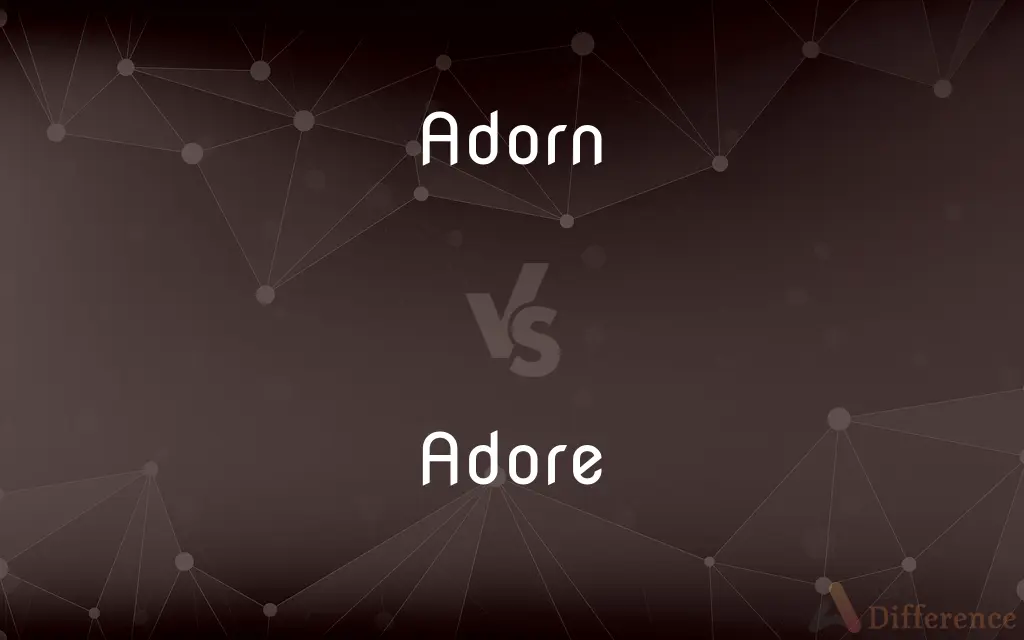Adorn vs. Adore — What's the Difference?
By Tayyaba Rehman & Maham Liaqat — Updated on February 24, 2024
Adorn involves adding beauty or decoration, whereas adore is an expression of deep love or admiration.

Difference Between Adorn and Adore
Table of Contents
ADVERTISEMENT
Key Differences
Adorning something typically involves enhancing its appearance through decorative elements or embellishments. For instance, a room might be adorned with paintings and flowers to make it more aesthetically pleasing. On the other hand, to adore someone or something is to hold them in deep affection or regard. This could involve emotional attachment rather than physical alterations, as when a parent adores their child.
Adornment often deals with tangible changes, such as adding jewelry to enhance personal appearance, while adoration is intangible, reflecting feelings or attitudes. An adorned dress might catch the eye at a party, but an adored singer captivates the heart of their audience.
Adornment can be temporary and changeable, like seasonal decorations in a home. In contrast, adoration tends to denote a more lasting and profound sentiment, such as the enduring love for a lifelong partner.
Adornments can be measured or evaluated by their aesthetic contribution, like the value added by a piece of art to an otherwise plain space. Adoration, however, is subjective and deeply personal, often defying quantification, like the immeasurable love a fan feels for their favorite musician.
The act of adorning can be a deliberate and planned activity, such as choosing the right accessories for an outfit. Adoration, however, can be spontaneous and instinctive, arising from genuine admiration or affection, like an impromptu applause for a moving performance.
ADVERTISEMENT
Comparison Chart
Nature
Physical enhancement
Emotional affection
Expression
Through decorations or enhancements
Through feelings or actions
Duration
Can be temporary or changeable
Often enduring and stable
Measurement
Can be evaluated aesthetically
Subjective and personal
Origination
Deliberate and planned
Spontaneous and instinctive
Compare with Definitions
Adorn
To enhance the appearance of something with decorative elements.
She adorned her hairstyle with fresh flowers for the wedding.
Adore
To love and respect someone deeply.
She adores her grandmother and visits her every weekend.
Adorn
To make something more attractive by adding ornamentation.
The bridge was adorned with festive lights for the celebration.
Adore
To worship or venerate.
In ancient cultures, deities were adored and offered sacrifices.
Adorn
To add beauty or elegance to something.
The hall was adorned with intricate tapestries.
Adore
To be very fond of something.
He adores jazz music and has an extensive collection of records.
Adorn
To decorate or embellish something.
He adorned his speech with a few well-chosen anecdotes.
Adore
To admire or cherish something greatly.
She adores the poetry of Rumi, finding deep inspiration in his words.
Adorn
To equip something with ornaments.
The Christmas tree was adorned with baubles and tinsel.
Adore
To regard with deep, often rapturous love.
They adore their newborn, spending every possible moment with her.
Adorn
To deck or dress with ornaments; to embellish; to set off to advantage; to render pleasing or attractive.
As a bride adorneth herself with her jewels.
At church, with meek and unaffected grace,His looks adorned the venerable place.
Adore
To love with one's entire heart and soul; regard with deep respect and affection.
It is obvious to everyone that Gerry adores Heather.
Adorn
Make more beautiful or attractive
Pictures and prints adorned his walls
Adore
Love and respect (someone) deeply
He adored his mother
Adorn
To lend beauty to
Flowers adorned the walkway.
Adore
To love (someone) deeply and devotedly.
Adorn
To enhance or decorate with or as if with ornaments
"[He] requires the presence of titles to legitimate and adorn ... his imperfect status" (Cynthia Ozick).
Adore
To love in the highest degree; to regard with the utmost esteem and affection; to idolize.
The great mass of the population abhorred Popery and adored Monmouth.
Adorn
Adorned; decorated.
Adore
Love intensely;
He just adored his wife
Adorn
Make more attractive by adding ornament, colour, etc.;
Decorate the room for the party
Beautify yourself for the special day
Adorn
Be beautiful to look at;
Flowers adorned the tables everywhere
Common Curiosities
Can adornments be functional as well as decorative?
Yes, some adornments can serve a functional purpose besides adding aesthetic value.
Can animals be adorned?
Yes, animals can be adorned, often for ceremonial or festive reasons.
Is adoration an emotion that can fade over time?
While adoration is typically a strong emotion, like all emotions, it can change over time.
Is adoration always positive?
Generally, adoration is positive, denoting love or deep admiration, but it can be excessive or misplaced.
Does adoration require physical presence?
No, one can adore someone or something from afar, without physical presence.
Does adoration imply a form of worship?
In some contexts, yes. Adoration can imply a level of reverence akin to worship, especially in religious or spiritual contexts.
Is adornment only applicable to physical objects?
Primarily, yes. Adornment typically involves adding decorative elements to physical objects or spaces.
Can you adore an inanimate object?
Yes, people can adore inanimate objects, often due to emotional or sentimental value.
Can adorn and adore be used interchangeably?
No, adorn relates to enhancing appearance, while adore is about deep affection.
Is adoration a stronger emotion than liking?
Yes, adoration is generally considered a much stronger and deeper emotion than mere liking.
Is adoration always directed towards people?
No, adoration can be directed towards objects, concepts, or activities as well.
Can technology be adorned?
Yes, technology can be adorned with decorative cases, skins, or accessories to enhance its appearance.
Can adorning oneself be considered vanity?
In some contexts, excessive adornment can be viewed as vanity, though it's culturally subjective.
Can landscapes or scenes be adorned?
Yes, landscapes can be described as adorned by natural elements like flowers or snow.
Can adornment affect the value of an object?
Yes, skillful adornment can significantly increase an object's aesthetic and monetary value.
Share Your Discovery

Previous Comparison
Pilferage vs. Theft
Next Comparison
Pricy vs. PriceyAuthor Spotlight
Written by
Tayyaba RehmanTayyaba Rehman is a distinguished writer, currently serving as a primary contributor to askdifference.com. As a researcher in semantics and etymology, Tayyaba's passion for the complexity of languages and their distinctions has found a perfect home on the platform. Tayyaba delves into the intricacies of language, distinguishing between commonly confused words and phrases, thereby providing clarity for readers worldwide.
Co-written by
Maham Liaqat












































